- Home
- Leslie Meier
Silver Anniversary Murder
Silver Anniversary Murder Read online
Books by Leslie Meier
MISTLETOE MURDER
TIPPY TOE MURDER
TRICK OR TREAT MURDER
BACK TO SCHOOL MURDER
VALENTINE MURDER
CHRISTMAS COOKIE MURDER
TURKEY DAY MURDER
WEDDING DAY MURDER
BIRTHDAY PARTY MURDER
FATHER’S DAY MURDER
STAR SPANGLED MURDER
NEW YEAR’S EVE MURDER
BAKE SALE MURDER
CANDY CANE MURDER
ST. PATRICK’S DAY MURDER
MOTHER’S DAY MURDER
WICKED WITCH MURDER
GINGERBREAD COOKIE MURDER
ENGLISH TEA MURDER
CHOCOLATE COVERED MURDER
EASTER BUNNY MURDER
CHRISTMAS CAROL MURDER
FRENCH PASTRY MURDER
CANDY CORN MURDER
BRITISH MANOR MURDER
EGGNOG MURDER
TURKEY TROT MURDER
SILVER ANNIVERSARY MURDER
Published by Kensington Publishing Corporation
A Lucy Stone Mystery
SILVER ANNIVERSARY MURDER
LESLIE MEIER
KENSINGTON BOOKS
www.kensingtonbooks.com
All copyrighted material within is Attributor Protected.
Table of Contents
Also by
Title Page
Copyright Page
Dedication
Chapter One
Chapter Two
Chapter Three
Chapter Four
Chapter Five
Chapter Six
Chapter Seven
Chapter Eight
Chapter Nine
Chapter Ten
Chapter Eleven
Chapter Twelve
Chapter Thirteen
Chapter Fourteen
Chapter Fifteen
Chapter Sixteen
Chapter Seventeen
Chapter Eighteen
Chapter Nineteen
Epilogue
KENSINGTON BOOKS are published by
Kensington Publishing Corp.
119 West 40th Street
New York, NY 10018
Copyright © 2018 by Leslie Meier
All rights reserved. No part of this book may be reproduced in any form or by any means without the prior written consent of the Publisher, excepting brief quotes used in reviews.
Kensington and the K logo Reg. U.S. Pat. & TM Off.
Library of Congress Card Catalogue Number: 2018932860
ISBN: 978-1-4967-1033-8
eISBN-13: 978-1-4967-1035-2
eISBN-10: 1-4967-1035-5
For John Scognamiglio
Editor Extraordinaire
Chapter One
“Honestly, I’m surprised he hasn’t killed her,” whispered Harry Nuttall, leaning over the deli counter at the IGA in Tinker’s Cove, Maine. He was speaking to one of his regular customers, Lucy Stone, who was doing her weekly grocery shopping.
Lucy was a part-time reporter for the Pennysaver, the local weekly newspaper, and had developed the habit of shopping after the paper’s Wednesday noon deadline, taking advantage of the free afternoon, which also happened to be a time when the usually crowded supermarket had few customers.
“So is it the usual?” Harry pulled on a fresh pair of plastic gloves. “A pound of ham, sliced thin, and a half of Swiss?”
“I guess I’ll live dangerously,” said Lucy, turning to watch Warren Bickford, Harry’s potential murderer, presenting his wife and likely murder victim, Sylvia, with his wrapped cold cuts. Then remembering the task at hand, she turned back to Harry. “Throw in a half pound of turkey breast, too.”
“Do you want it sliced like the ham?” asked Harry. Lucy’s attention had returned to the Bickfords; Warren’s deli purchase had clearly not satisfied Sylvia. She glared at the label on the package through heavily made-up eyes, ran her red-tipped nails through her obviously bleached blond hair, pointed at the label, then roughly thrust the packet back to Warren. “Black Forest, Warren. I told you Black Forest! Honestly, how many times do I have to repeat myself?”
Warren bent his head and seemed to offer an apology, then trotted obediently back to the deli counter.
“Same thickness as the ham?” Harry asked again, the grin on his face revealing his amusement at Lucy’s fascination with the Bickfords.
Lucy considered asking him to slice the turkey a bit thicker than the ham, but aware that Warren was under the gun to deliver the correct order, changed her mind. “Same,” she said, turning to give Warren a big, warm smile. It seemed the least she could do for the poor, henpecked husband. “Nice day,” she said, referring to the lovely, mild, May weather that was such a treat after the bitter cold Maine winter, which this year had been followed by an especially blustery March and extremely muddy April.
“Sure is,” replied Warren, unzipping his jacket. Lucy guessed he was in his early fifties, and like most middle-aged men in Tinker’s Cove, he was wearing khaki pants and a sports shirt topped with a light sweater. His thinning hair was combed in the standard left-parted barbershop cut and he was developing a bit of a paunch. That growing tummy was probably the result of an occupational hazard; as owner and operator of a limo service he spent a lot of time sitting behind the wheel. “Sorry to bother you, Harry, but I got the wrong ham. I should’ve asked for Black Forest. I hope it’s no problem.”
“No problem,” said Harry, placing Lucy’s three packages on the counter. “It’s already wrapped. I’ll save it for the next customer who wants Virginia ham.”
Warren let out a relieved sigh. “Thanks, Harry.” It seemed he was about to say something more, perhaps a reference to his wife, but thought better of it and bit his lip instead, rocking slightly from one sturdy Timberland shoe to the other while waiting for Harry to slice his Black Forest ham.
Lucy put her packages in her cart and pushed it along, heading for the meat counter, which ran along the back wall of the supermarket. She paused at an island displaying English muffins—buy one get two free, a deal that was hard to pass up—and witnessed Warren rejoining his wife and presenting the correct ham, rather like a little girl offering flowers to the queen.
“Warren, you always do this. You don’t speak up and people take advantage of you. Just look—this ham is sliced much too thick. Not that I blame Harry. He isn’t going to shove that slicer back and forth any more times than he has to, if people don’t speak up and ask for thin slices.”
Warren stood like a statue, letting his wife’s criticisms rain down on him. “Do you want me to take it back, dear?” he asked, with the slightest note of sarcasm in his voice.
Sylvia expelled a large sigh. “No, Warren. We don’t have time. We have a big order this week.” She flourished her shopping list. “Do you think you could manage a simple task like getting the coffee while I look over the meat? Beef chuck is supposed to be on sale, but I’ll be amazed if they have any left this late in the week. They probably sold it all on the weekend. Not that they’ll get away with it, not with me. I’ll insist on a rain check.”
“You do that, dear,” said Warren. “Quite right. Now, do you want decaf or regular, and what brand? Or should I go for price?”
“It never ceases to amaze me, Warren. How long have we been married? Twenty-five years next month, and you don’t know what brand of coffee we drink?”
“Well, it’s usually the one in the red package, but sometimes it seems to me we have the blue kind.”
“The red kind? The blue kind? Honestly, Warren, you sound like a child.” She rolled her eyes. “Get the Folgers, unless Maxwell House is on sale for half price. And don’t fall for that
foul French roast stuff. Can you do that for me?”
“Yes, dear.” Warren trotted off in the direction of the coffee aisle, and Sylvia, as promised, attacked the meat counter. Lucy, hoping to avoid witnessing any more of Warren’s humiliations, slipped off into the cereal aisle. Distracted by a special on canned soups on the end cap, where she was searching for chicken noodle but only finding minestrone and vegetarian vegetable, she wasn’t quick enough to miss Warren’s presentation of a green can of coffee.
“Green is decaf, Warren; everybody knows that,” declared Sylvia, in a voice that could probably be heard on Metinnicut Island, ten miles across the bay.
“But it’s Folgers, like you said.” He attempted a weak defense. “They could have changed the package, you know.”
“No, Warren, they haven’t changed it.” Sylvia paused to sniff a cello-wrapped piece of chuck, then replaced it. “Now, take this back and get the red Folgers. And do hurry. We’ve got a lot to do and I’m going to have the butcher cut me a fresh piece of chuck. The nose knows—you can’t fool my nose. This meat has probably been sitting out here since Sunday.”
“Right, dear,” said Warren, obediently hurrying back to the coffee section to complete his assignment. Watching him go, Lucy thought Harry might have a point. Some day, maybe some day soon, Warren was bound to snap.
Diverting as that thought was, Lucy had a long shopping list that demanded great concentration as she frequently consulted the weekly ad for specials, checked prices, and thumbed through her coupon file. From time to time she heard Sylvia’s strident voice berating Warren for something or other, but she didn’t actually encounter the Bickfords again until she reached the checkout counter.
Warren was busy bagging their order when Dot Kirwan, the cashier, announced the amount due. “A hundred and forty-seven dollars!” exclaimed Sylvia. “We don’t want to buy the store, do we, Warren? We just want to eat for a week.”
“Should we put this back, dear?” suggested Warren, who was holding a large bottle of expensive olive oil. “We could get a smaller one.”
Sylvia shook her head. “The larger one is a better value, Warren. You ought to know that. It’s cheaper per ounce. Now pay the bill and stop grumbling.”
“Yes, dear,” said Warren, pulling his wallet out of his back pocket and handing a credit card to Dot.
“Let me see that!” demanded Sylvia, snatching the card out of Dot’s hand. “Just as I thought. It’s the wrong card!”
Dot’s eyes met Lucy’s, and they both struggled to maintain neutral facial expressions while Warren fumbled with his wallet. The two women were of like minds and Lucy had great respect for Dot, who was the widowed matriarch of a large family. Most of her kids and grandkids worked for the town, filling positions in the fire and police departments, which made Dot a valuable source of inside knowledge for Lucy.
“Oh, give me that wallet!” demanded Sylvia, losing patience. He obliged and she flipped it open, pulling out a wad of plastic cards. “My word! What is all this? Exxon, Sears, Shell, Visa, Plenti . . . Ah, finally! This is the one that gives us rewards, Warren.” She waved the colorful bit of plastic underneath his nose. “Only use this one, from now on, only this one. You don’t need the rest. You might as well cut them up and throw them away.”
“I’ll do that, dear,” said Warren, who had continued packing the groceries and was holding the disputed can of Folgers coffee.
“Just slide the card on the keypad,” urged Dot, and Sylvia complied, signing with a flourish. Warren carefully placed a plastic bag containing their eggs on the child seat and pushed the cart toward the door, followed by Sylvia, who was checking the register tape as she walked.
“Thank you and have a nice day,” said Dot. Unable to stifle her laughter any longer, she burst into a fit of giggles. “I call them the Bickersons,” she whispered to Lucy, as the automatic door opened and the Bickfords exited the store.
Lucy felta certain sympathy for Sylvia as Dot finished ringing up her order, which amounted to nearly two hundred dollars despite her coupon clipping. Sylvia was right about one thing, she decided, as she pushed her heavily loaded cart out to the parking lot, and that was the price of groceries. The sun this afternoon was very bright, and she paused in the shady overhang to put on her sunglasses only to find they were missing. They weren’t in the usual pocket on the outside of her purse, and they weren’t inside, along with her wallet, granola bar, numerous pens, phone, and reporter’s notebook, either. Sighing, she gave the cart a shove and stepped into the sunlight, squinting. She’d almost finished loading everything into her trunk when it came to her: she’d pulled the sunglasses off when she got to work earlier that day and set them down on her desk. They were most likely still there, so she’d have to swing by the Pennysaver office to retrieve them.
Lucky for her, there was a vacant parking spot right in front of the weekly newspaper’s Main Street office and Lucy swooped right in, then dashed into the office, setting the little bell on the door to jangling. Somewhat to her surprise, she was greeted not only by the receptionist, Phyllis, but also by her editor, Ted, who didn’t usually stick around the office after deadline. The two were standing at the reception counter, heads bent over a press release.
“What’s up?” asked Lucy. “Breaking news?” Late breaking news was a problem for a weekly, which had to wait an entire week before printing stories that by then had become stale.
“Not hardly,” said Ted, chuckling. He was not only the editor, but also the publisher and chief reporter for the paper, which he’d inherited from his grandfather. That celebrated New England journalist’s rolltop desk still dominated the old-fashioned newsroom and was Ted’s most prized possession.
“You’ve got to see it to believe it,” said Phyllis, laughing so hard that her sizable bosom was jiggling as she handed the press release to Lucy. Phyllis was celebrating spring’s late arrival by wearing a pink bouclé sweater that matched her pink reading glasses and her hair, also dyed pink.
Lucy quickly scanned the press release, which announced in bold capitals that Sylvia and Warren Bickford were soon to celebrate their twenty-fifth wedding anniversary in June by renewing their vows, that joyous ceremony to be followed by a reception to which the whole town would be invited. And that was not all, promised the press release, which went on to invite all the ladies of the town to participate in a fashion show of wedding gowns from the past by modeling their own dresses. All those interested should contact Sylvia at her shop, Orange Blossom Bridal.
“This is so funny,” said Lucy, when she’d finished reading. “I just saw the Bickfords, who Dot Kirwan calls the Bickersons, at the IGA. She picked on him mercilessly; the poor guy couldn’t do anything right. Harry, the deli guy, said he was surprised Warren hasn’t murdered Sylvia. A divorce would be more appropriate than renewing their vows. The whole town is going to be laughing at them.”
“It’s pretty smart, if you ask me,” said Ted. “It’s great publicity for her bridal boutique, and also for his limo company.”
“It could backfire,” said Lucy. “Everybody knows it’s an unhappy marriage. Nobody’d be surprised if Warren bailed out, or worse.”
“Oh, I don’t know,” said Phyllis, in a thoughtful tone. She was a bit of a romantic, having found her great love, Wilf Lundgren, rather late in life. “There must be something that keeps them together, despite outward appearances. I think it’s kind of sweet.”
Lucy spotted her sunglasses, exactly where she had left them, and grabbed them, perching them on top of her head in Jackie Kennedy style. “Speaking of sweets, I gotta run before my ice cream melts—see ya tomorrow!”
Lucy thought about marriage as she drove the familiar route through town, down Main Street, and out to Route 1, then turning onto Red Top Road and up the hill to the handyman’s special she and Bill had restored and in which they’d raised their four children. Sometimes the glue held, even for couples like the Bickersons, who didn’t seem terribly happy, and sometimes that glue
dried up and crumbled, like the stuff she’d spent hours scraping off the back of an antique picture frame she’d recently picked up at an estate sale. There had been rough spots in her marriage to Bill—she remembered fights but not exactly what caused them—but she’d never seriously considered divorce. Maybe, she admitted to herself, that was because she was far too practical to attempt to raise four children by herself, especially considering the mostly low-wage jobs available to women like her in coastal Maine. She didn’t want to spend her summers juggling a couple of jobs, chambermaiding by day and waitressing by night as many local women did.
That wasn’t quite fair to Bill, she thought with a smile, pulling into the driveway. She loved him. She’d been distant at first, when he began chatting her up in college, but through sheer persistence he’d gradually won her over. Now, after the house and the kids and grandson Patrick, he was so much a part of her that she couldn’t imagine life without him.
Though, she admitted to herself as she began toting the heavy recyclable bags of groceries into the house, she could use a little help from him right now. What was it her mother used to say, when her father was nowhere to be found? Something about wishing she could put on her hat and walk out the door, though that didn’t quite take into account the fact that Dad was just going to work. She knew that Bill, who was a restoration carpenter, was hard at work on a big project, transforming an old, abandoned church into a vacation home for a successful Portland restauranteur and his family.
Still, it was a big job, toting all the groceries that would feed herself and Bill, and their two daughters who hadn’t yet flown the nest. The fact that Sara, now a graduate student at nearby Winchester College, was a vegetarian, and Zoe, an undergraduate at the same institution, was avoiding gluten, didn’t make things any easier. Her grocery list was now filled with the special foods the girls demanded: quinoa, kale, organic yogurt, free-range eggs, hormone-free milk, on and on it went. She dropped two heavy bags on the kitchen table and went out for more, eventually making three trips to get everything inside. And then there was the unloading, the sorting and the storing.

 Christmas Card Murder
Christmas Card Murder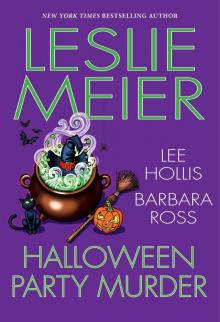 Halloween Party Murder
Halloween Party Murder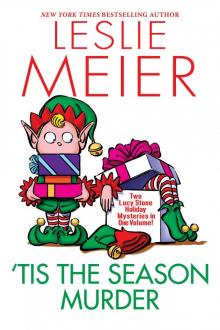 'Tis the Season Murder
'Tis the Season Murder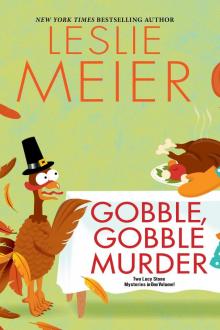 Gobble, Gobble Murder
Gobble, Gobble Murder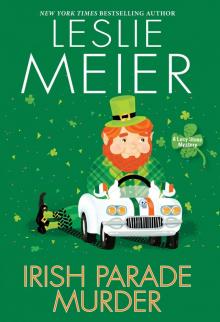 Irish Parade Murder
Irish Parade Murder Bake Sale Murder
Bake Sale Murder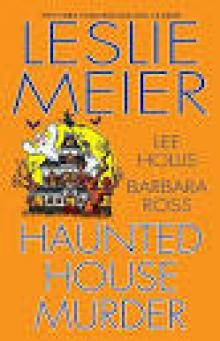 Haunted House Murder
Haunted House Murder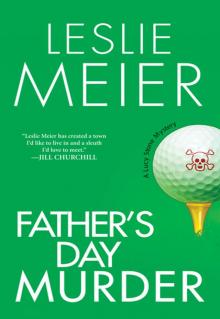 Father’s Day Murder
Father’s Day Murder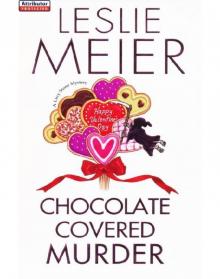 Chocolate Covered Murder
Chocolate Covered Murder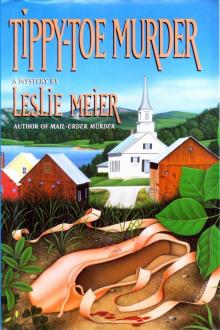 Tippy Toe Murder
Tippy Toe Murder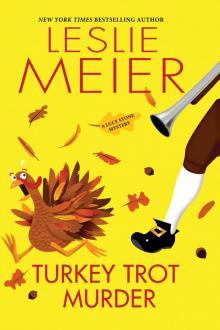 Turkey Trot Murder
Turkey Trot Murder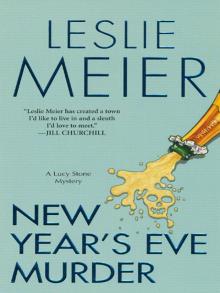 New Year's Eve Murder
New Year's Eve Murder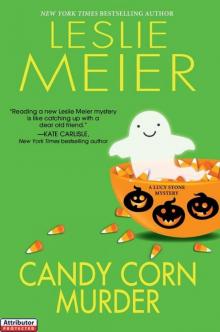 Candy Corn Murder
Candy Corn Murder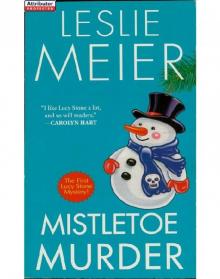 Mistletoe Murder
Mistletoe Murder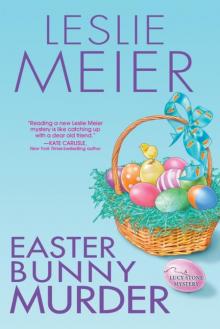 LStone 20 - Easter Bunny Murder
LStone 20 - Easter Bunny Murder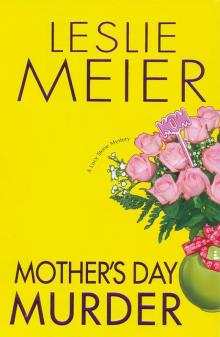 Mother's Day Murder
Mother's Day Murder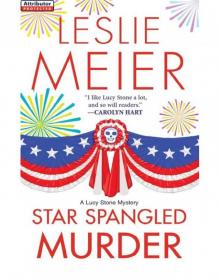 Star Spangled Murder
Star Spangled Murder Silver Anniversary Murder
Silver Anniversary Murder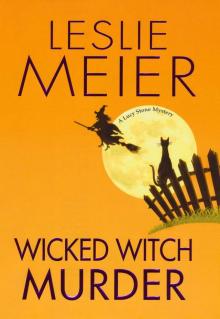 Wicked Witch Murder
Wicked Witch Murder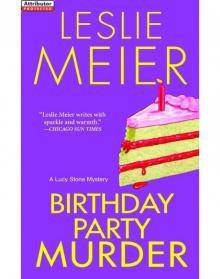 Birthday Party Murder
Birthday Party Murder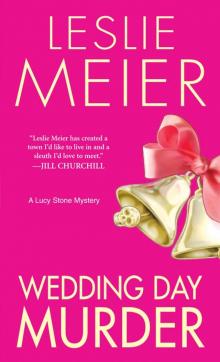 Wedding Day Murder
Wedding Day Murder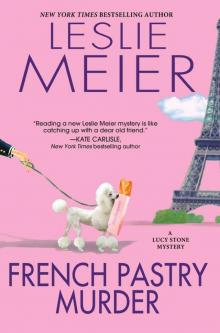 French Pastry Murder
French Pastry Murder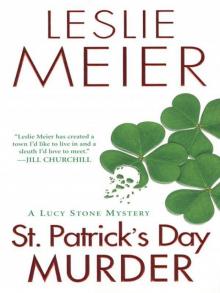 St. Patrick's Day Murder
St. Patrick's Day Murder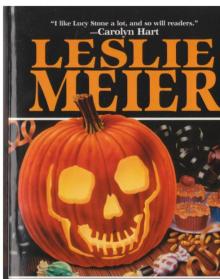 Trick or Treat Murder
Trick or Treat Murder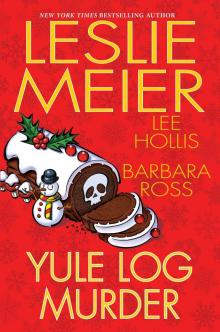 Yule Log Murder
Yule Log Murder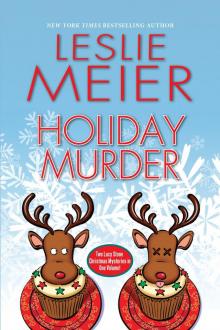 Holiday Murder
Holiday Murder British Manor Murder
British Manor Murder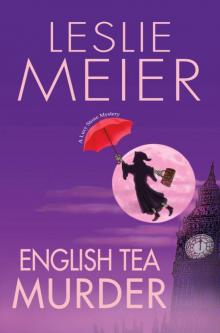 English Tea Murder
English Tea Murder